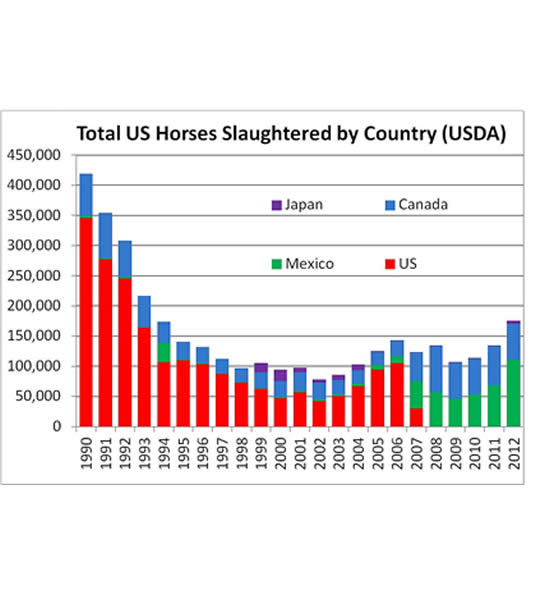February 27, 2013 – Chicago (EWA) – According to USDA statistics, the slaughter of US horses soared by 32% in 2012 to over 176,000, a twenty year high. The horses were exported largely to slaughter houses in Mexico and Canada, which then shipped the meat to the EU (Europe Union) where horse meat has subsequently been found to have been fraudulently substituted for beef in everything from burgers to lasagna and even school lunches.
The number of horses exported to Mexico increased from 68,429 in 2011 to 110,202 in 2012, a 61% increase while exports to Canada actually decreased slightly (7.5%) to 59,812.
Despite the EU repeatedly finding the prohibited carcinogen phenylbutazone and other banned substances in the meat of US horses, and despite its own audit reports stating that they still have no effective way of preventing contaminated horse meat from entering their food chain, the authorities have allowed the trade to continue to expand.
Both Canada and Mexico require slaughter horse sellers to provide Equine Information Documents (EIDs) stating any drugs the horses have been given. But inexplicably, Mexico does not test for phenylbutazone or even include it on seller affidavits despite the fact that the drug is at the top of the EU’s banned substance list.
Until recently it was thought that this endangered only consumers of horse meat, but now it is clear that is not the case. The finding of horse meat in meals supplied to schools and hospitals is of particular concern since children are extremely vulnerable to even trace amounts of phenylbutazone, which can cause potentially lethal aplastic anemia.
The reason for both the scandal and the contamination lies in the nature of the horses. US horses being sent to slaughter are overwhelmingly young sport horses, four to eight years old, and at the end of very short careers. The horses are comprised largely of Quarter Horses (~ 70%), followed by Thoroughbreds and Standardbreds. Most were used in rodeo and racing before being dumped to slaughter.
Since the horses are a byproduct of these sports, they were not raised for slaughter and were almost universally given drugs prohibited in food animals. The low cost of these horses ($100 to $500) makes them far cheaper than beef, thus providing a huge incentive for the fraudulent substitution.
Increases in the cost of keeping horses in recent years have suppressed the domestic market for recreational horses, leaving the kill buyers with bargains galore.
A ban on funding for US horse meat inspections, which was passed by Congress in 2006, was rescinded in 2011, but to date no horse slaughter plants have opened in the US.
Despite the devastating effect of the scandal on beef sales in the EU, and endless revelations about contaminated horse meat, Oklahoma is considering repealing its own ban on horse slaughter in hopes of enticing a plant to that state.
The Equine Welfare Alliance (EWA) is a dues-free 501c4, umbrella organization with over 275 member organizations and over 1,000 individual members worldwide in 18 countries. The organization focuses its efforts on the welfare of all equines and the preservation of wild equids. www.equinewelfarealliance.org
Contact:
John Holland
540-268-5693
john@equinewelfarealliance.org

 September 19, 2011 – Chicago (EWA) – As Senator Max Baucus and the horse slaughter lobby make a concentrated effort to persuade Congress to reverse the 2007 defunding of USDA horse slaughter inspections, evidence is growing that the main consumers of US horse meat are not likely to welcome the move.
September 19, 2011 – Chicago (EWA) – As Senator Max Baucus and the horse slaughter lobby make a concentrated effort to persuade Congress to reverse the 2007 defunding of USDA horse slaughter inspections, evidence is growing that the main consumers of US horse meat are not likely to welcome the move.